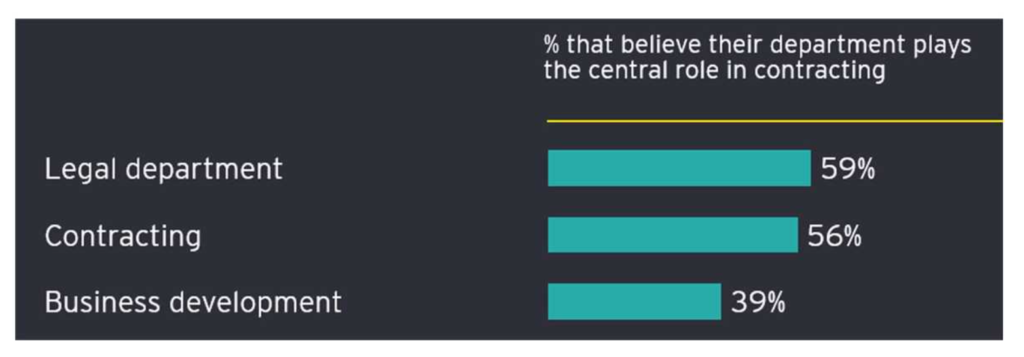
A new survey by EY Law and the Harvard Law School Center on the Legal Profession has found that large organisations have a significant problem around who ‘owns’ the contracting process, which appears in turn to be leading to strategic confusion and slowing down change projects.
For example, 39% of business development teams at corporates said they believed they played ‘the central role in contracting’. While, perhaps surprisingly, only 59% of inhouse legal departments, and 56% of specialised contracting teams, said the same.
The survey, the second in a series of major studies of the inhouse legal world, said that although most large companies now have put in place some form of contracting protocols and developed formalised workflows, including the creation of dedicated contracting teams, deciding who actually ‘plays the central role in contracting’ for the company is by no means clear, i.e. who owns this key challenge, and implicitly then who steers strategy around it. (See graph below).

This matters because if ‘ownership’ of a key element of your business is unclear, and as seen here potentially is shared between sometimes siloed parts of the organisation, i.e. inhouse legal vs sales, then you’re building in systemic problems that will be very hard to unpick.
From Artificial Lawyer’s perspective, such a scenario in turn undermines the use of tech, such as CLM systems, as any tool will only return in value what is put into it – and if those handling contracting are moving in different directions, or have competing priorities, then things will go awry.
The EY/Harvard survey certainly paints a picture of many related challenges here – although they are not new. For example, the data shows that:
- 92% of organisations surveyed are trying to transform their handling of contracts,
- BUT…….’the majority of respondents are struggling in the face of significant obstacles’
- 98% say ‘they face critical barriers’
- And, 38% say they have already tried to change and have failed.
Clearly, the evidence that inhouse teams are facing challenges around improving contracting processes is now well-developed. But, for this site at least, the root of this is not ‘because inhouse lawyers are too busy’ or some other mundane reason, but in fact because internal governance around contract ownership is confused. That internal lack of clarity then undermines efforts across the legal team, and other parts of the business, to change how things operate.
Or, to put it simply: if an organisation doesn’t know who owns a problem, then that problem is unlikely to get fixed.
Of course, you could ask: does it matter? And also, do these companies really care? The survey answers that:
- Inefficient contracting processes have slowed revenue and ‘resulted in lost business at more than half of organisations surveyed globally’.
- And because of this, ‘92% of organisations plan wide-reaching changes to contract management’.
But, that is not the only strategic challenge. As EY states in the survey narrative: ‘Although most (70%) organisations have a formal contracting technology strategy in place, almost all (99%) say they do not have the data and technology needed to optimise their contracting process. As a result, there is a gap between strategy and execution and many organisations face increased risk because they are unable to measure, manage and control adherence to their policy.’
Interestingly, despite the growth in legal ops as a career path inside corporates, the survey also found that one third (34%) said they ‘find it hard to recruit people with the skills needed to identify and implement the technology they need’.
I.e. one third of companies, out of a large number who do want change, say they can’t even find the people needed to implement that change.
Again, this site would say that the root cause here is not that companies cannot actually find people with tech skills to help – they are out there – it’s that there is a decision-making ‘fog’, one might say, that prevents decisive action. After all, if the C-suite of a large company really was focused on problem X, and wanted to throw lots of time and money at the challenge, it would get it done.
As is often the case, it’s not that an organisation doesn’t want to change, nor that they cannot change, it’s that the ownership of the problem is confused and therefore leadership – which is vital to solving organisational issues – is lacking.
As this site’s founder has found during many years working as a strategy consultant, leadership is one of the most critical components, (if not the most critical), in any change management project.
As for the survey authors, this is what they say. John Knox, EY Global Legal Managed Services Leader, explained: ‘The importance of getting contracting right cannot be underestimated. For many organisations it is something of an ‘Achilles heel’, but with the right transformation efforts focused around people, process and technology, contracting can actually become a business enabler and differentiator.
The survey shows that one way in which organisations aim to tackle these challenges is through working with subject matter leaders and external providers. This type of co-sourcing arrangement can help clarify responsibilities, centralise processes and help ensure the right work is aligned with the right resources so that organisations can focus on more strategic activities.’
While David Wilkins, Lester Kissel Professor of Law, Vice Dean for Global Initiatives on the Legal Profession, added: ‘Contracts are at the core of every business. They determine how growth happens and how risks are managed. It is therefore absolutely crucial that organisations have effective systems and processes to manage every aspect of the contracting process, from negotiation and execution, to termination or renewal, as well as an accurate understanding of the obligations, benefits, and risks across the entire spectrum of their contracts.
‘Yet as the survey underscores, the fact that so many functions have an interest in – or responsibility for contracting – makes it difficult for most companies to manage their contracts effectively. As we enter a period of accelerated growth and risk, business leaders must find new ways to balance these internal interests and manage their contracting functions for the future.’
So, there you go. There really is so much positive work to be done in this area. And although there are solutions, including tech-based ones, without the leadership needed, as well as organisational clarity, then progress will be hard to achieve.
The one really optimistic side to all of this is the desire for change.
—
The survey can be found here.
So who do you recommend own the contracting process?